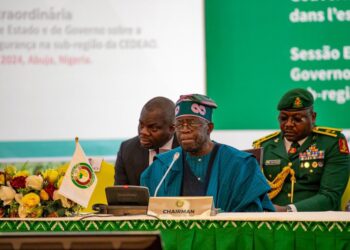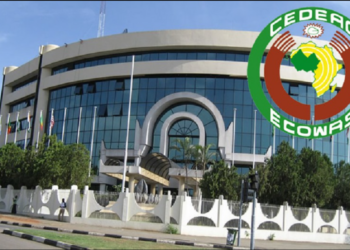Heads of member states of the Economic Community of West African States (ECOWAS) convened in Lagos on Saturday to advance the finalization and approval of the design for the $15 billion Lagos-Abidjan Corridor Highway Development Project.
This critical infrastructure initiative is set to enhance regional economic integration by connecting five West African countries—Côte d’Ivoire, Ghana, Togo, Benin Republic, and Nigeria—through a 1,068-kilometer highway that will traverse eight border towns, starting at Eric Moore in Lagos and ending in Abidjan, Côte d’Ivoire.
The News Agency of Nigeria (NAN) reported that the meeting, chaired by Nigeria’s Minister of Works, Dave Umahi, focused on advancing the project towards the procurement phase, with construction targeted to begin in 2025.
Umahi noted that the project, which is currently in the study phase, has been under development for 11 years, receiving significant support from the African Development Bank.
“The design of the project, ESIA design, conceptualisation, funding mechanisms have been on in the past 11 years,” he said.
“As of today, we are going to listen to the committee of experts in terms of the design and so we believe that we will finalise and approve the design today, and then we set the goal for procurement, probably in our next meeting.”
The NAN report further noted that the Lagos-Abidjan Highway project is expected to carry over 500,000 passengers daily and significantly boost trade, tourism, and economic activities within the region.
The Lagos-Abidjan Corridor Highway is part of the broader Dakar-Lagos Corridor, one of the flagship development programs of the Economic Community of West African States (ECOWAS) and is expected to be a key driver of regional integration.
More insight
The meeting also featured remarks from Ghana’s Minister of Roads and Highways, Mr. Francis Boakye, who emphasized the critical role that infrastructure plays in driving socio-economic development, particularly in developing regions like West Africa.
He highlighted that the Lagos-Abidjan highway would be instrumental in facilitating trade, tourism, and overall economic growth across the West African sub-region, drawing parallels with the U.S. economic boom, which was largely propelled by its extensive highway system.
Dr. Amede Kouakou, the Minister of Equipment and Road Maintenance for Côte d’Ivoire, reiterated his country’s commitment to accelerating the project, stressing the significant benefits it will offer to both Nigeria and Côte d’Ivoire, as well as the broader region.






















